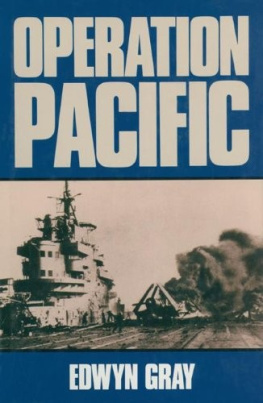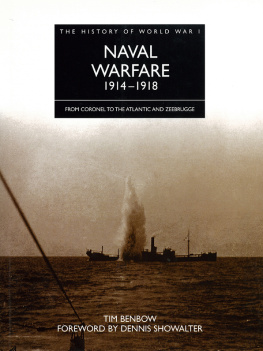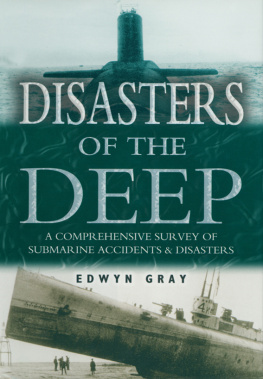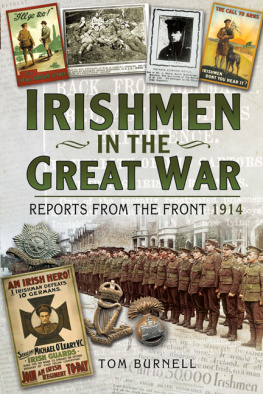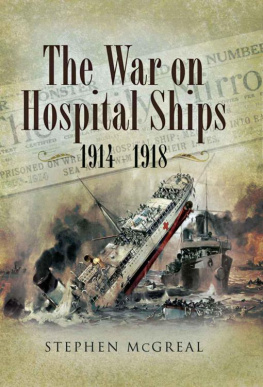The
U-Boat War
19141918
The
U-Boat War
19141918
EDWYN GRAY
LEO COOPER
LONDON
First published in Great Britain in 1972 by Seeley,
Service and Co. Ltd., as The Killing Time
Reprinted with corrections in 1994 by
LEO COOPER
190 Shaftesbury Avenue, London, WC2H 8JL
an imprint of
Pen & Sword Books Ltd.,
47 Church Street, Barnsley, South Yorkshire S70 2AS
Copyright 1972,1994 Edwyn Gray
A CIP catalogue record for this book is available from the British Library
ISBN 0 85052 405 9
Printed and Bound in the USA
CONTENTS |
| : |
| : |
| : |
| : |
| : |
| : |
| : |
| : |
| : |
| : |
| : |
| : |
| : |
| : |
| : |
| : |
| : |
| : |
| : |
| : |
ILLUSTRATIONS
hit your enemy in the belly, and kick him when he is down, and boil his prisoners in oilif you take anyand torture his women and children. Then people will keep clear of you
Admiral of the Fleet Lord Fisher, speaking at the
Hague Peace Conference in 1899.
WHEN A NEW and untried weapon of war brings a mighty empire to the brink of defeat there is always a story worth telling. In 1914 the U-boats were such a weapon and this book tells the story of the Kaisers attempt to destroy the British Empire by a ruthless campaign of unrestricted submarine warfare. It is a story that begins with Germanys first tentative experiments with submarines in the nineteenth century and ends in the revolutionary ferment of the naval mutiny which brought about the Kaisers final defeat. In between is a detailed account of the terror campaign which, by April, 1917, brought Great Britain within a hairsbreadth of surrender. It is a savage record of men fighting for their lives below the surface of the sea and of atrocity, piracy, and murder. But it is also a testament to the heroism, compassion, and skilled seamanship of the men who were justly proud to wear the insignia of the Deutsche Unterseeboots Flotille.
My interest in this fascinating struggle was first aroused when I chanced upon this passage in William Guy Carrs book, By Guess and by God: The story of the North Sea operations (was) as much a story of men sealed in unsavoury tin cans, wallowing around the shallow ocean and continually at war with Nature, as it (was) a story of dramatic encounters between craft of opposing navies. In this respect the experiences of German submarine officers and men must have been identical with our own. The thought that the submariners on both sides endured the same hardships, triumphs, and defeats, decided me to write this account of the U-boat war as a sequel to my previous book on British submarine operations in the Great War, A Damned Un-English Weapon. And I have endeavoured to maintain a similarly objective and impartial standpoint throughout.
After the war the American author Lowell Thomas visited Germany to interview a large number of former U-boat captains about their experiences and the results of his painstaking labours were published in Raiders of the Deep in 1929. His kind permission to quote extensively from these interviews has enabled me to include many vividly personal comments by the men who actually fought the U-boat war beneath the sea and I hope that these valuable extracts have given my narrative a balance that would have been difficult to obtain in any other way.
As usual I would like to acknowledge my personal debt to the many authors and historians who, since 1918, have unravelled the complex details of the U-boat campaigns and I must also thank Doubleday & Co Inc., New York; Sidgwick & Jackson Ltd., The Estate of the late Sir Henry Newbolt and the Longmans Group Ltd., Hodder & Stoughton Ltd., the Estate of the late Admiral of the Fleet Lord Keyes, B. T. Batsford Ltd., George G. Harrap & Co Ltd., Frederick Muller Ltd., The Hogarth Press Ltd., John Farquharson Ltd., Constable & Co Ltd., The Hutchinson Publishing Group Ltd., Anthony Sheil Associates Ltd., The Hamlyn Publishing Group Ltd., and The Times Newspapers Ltd. for permitting me to use their copyright material. I am grateful, too, to the Librarian and Photo Librarian, and their staffs, of the Imperial War Museum for their willing assistance in tracing document and photographs. My apologies to those other copyright holders from whom I have quoted but have been unable to trace.
Finally I must express my appreciation to A. J. Brown of the Naval Records Club for the information he has supplied me on many occasions.
Any man brave enough to go under the surface of the sea in a submarine is, to me, something of a hero. And although some U-boat captains were, as Lloyd George once said, Pirates and murderers, the majority were decent ordinary men with an unpleasant job to do. It is to the decent ordinary men of both sides that this book is dedicated.
EDWYN GRAY
The essence of war is
violence
2.20 pm Directly in front of us I sighted four funnels and the masts of a passenger steamer at right angles to our course coming from the SW and going towards Galley Head1
IT WAS THE afternoon of 7 May, 1915. As Kapitanleutnant Walther Schwieger entered the sighting report in U-20s log he had no premonition of what the future heldno warning that within the next hour his actions would make him the most hated man in the world. He scribbled his initials against the margin of the log-book entry, glanced quickly at the chart spread out across the control-room table, and snapped his fingers for the periscope to be raised ready for another hurried glimpse of his intended quarry.
U-20 was on her way home to the Fatherland after a marauding cruise along the coast of Ireland. With the overnight fog persisting well into the morning, fuel tanks running dangerously low, and only two torpedoes left in the tubes, Schwieger had decided to call it a day. Ordering the pilot to work out a course for the return to Wilhelmshaven, the U-boat skipper settled himself comfortably into a battered old leather armchair and began reading a book.
The patrol had been dull and unrewarding. True, he had sunk a sailing-ship and two steamers off Waterford, but these were paltry game compared with the achievements of Hersing, Weddigen, Valentiner, and the other great aces of the U-boat service. And Walther Schwieger was an ambitious man. A thirty-two year old bachelor from an old and respected Berlin family, he had served in submarines since the earliest pioneer days before the war. Tall and broad-shouldered, with blue eyes and blonde hair, he was every inch an officer of the Imperial German Navycalm, correct, and coldly efficient. As a fellow captain remarked: He knew exactly where he was goingand be damned to anyone who tried to stop him1
The morning of the 7th had already brought one disappointment. Running submerged at 60 feet to avoid the danger of being rammed accidentally in the fog, Schwiegers attentive ears had caught the sound of powerful propellers churning the surface overhead and he took U-20 up to investigate.





